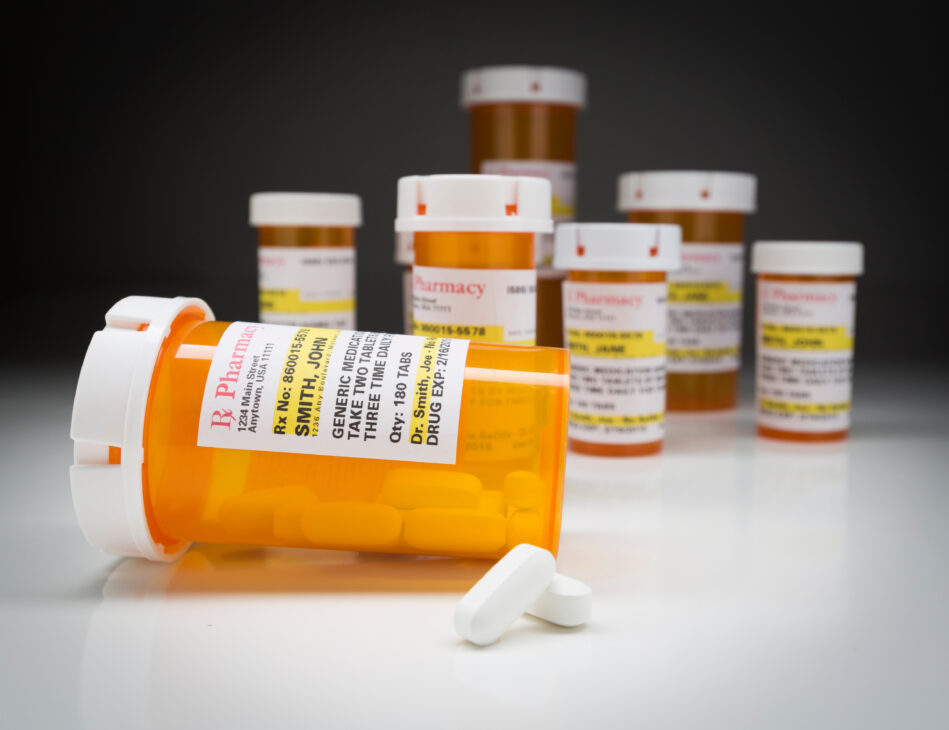MedShadow recently posted an article in which a journalist investigates his own sleep apnea diagnosis and ends up forgoing expensive machinery and learning that sleeping on his side was all it took in his case to keep his oxygen levels stable through the night. In the Kaiser Health News article, author Jay Hancock describes an “expensive testing prescription cascade” including an at-home test and two separate nights in a sleep lab testing for different characteristics of the condition.
Testing is not the only cascade in medicine. In recent years, researchers have started to identify “prescription cascades”—situations in which a patient is prescribed a medication, and that medication causes side effects, so they’re prescribed another drug to treat those side effects, then maybe another and another. While Hancock’s testing cascade was both inconvenient and expensive (at least to his insurance company,) it didn’t leave him with any long-term health issues. The price of a prescription cascade, on the other hand, may cost you days, weeks, or years of your health.
MedShadow reached out to Medical Advisory Board Members and Founders of The People’s Pharmacy, Joe and Terry Graedon, to learn about some of the most common prescription cascades and how patients might avoid them.
The conversation below has been edited for brevity and clarity.
MedShadow: What is a prescription cascade?
Joe Graedon: A perfectly” reasonable” — and I’m putting reasonable in quotation marks — prescription for a condition can start a cascade of events that can really be quite daunting, especially because we now live in a siloed medical system.
The initial prescription perhaps seemed reasonable. For example, everybody would agree “well, if the patient is unable to get their blood pressure under control with all of the standard non-drug approaches: losing weight, exercising, watching their sodium, etc, it’s now time to introduce a blood pressure medication.”
So now, the patient is given a blood pressure pill. The patient goes home and starts taking this blood pressure pill. For two or three weeks, everything is fine.
Terry Graedon: And then, they start to cough.
Joe Graedon: So now they’ve got a little hack, mostly at night. And it doesn’t start out very bad. It’s kind of annoying, but it’s not the kind of cough that anybody would get too excited about. It could be allergies; there are a lot of things that it can be attributed to.
[Editor’s note: coughing is a common side effect of blood pressure medications.]
Terry Graedon: If it gets quite annoying, and it sometimes does, the patient will go back to the doctor and say, “Doctor, I’ve got this cough, and it’s really bothering me.” And sometimes the doctor will say, “well, we’ll work you up for allergies or flu or whatever might be causing a cough.”
Joe Graedon: This is when we get into the issue of the siloed system. And so now the person is actually referred to an allergist. And the allergist does allergy testing, and maybe we just discovered that you are allergic to grasses. The allergist says, “well, we could start with an antihistamine. We could give you some allergy shots.” Now, the person is now being treated for allergies.
They are still coughing, especially at night. It’s gotten so much worse over the course of several weeks so that now they’re waking up at two or three o’clock in the morning and there’s this acid reflux feeling. And now the doctor says “well, you better go see a gastroenterologist.” And now they’re on a proton pump inhibitor (PPI), like Prilosec or Nexium.
So now they’ve gone from the blood pressure pill, to allergy medicine, to a PPI. And now, we might have some side effects associated with the antihistamine, which could be a dry throat, dry mouth, dry nose, and then the proton pump inhibitor may be causing some other side effects of its own, for example, over a period of time, it could cause a vitamin B12 deficiency. So now we’re into this big cascade.
Terry Graedon: When really, what was needed, was for the initial prescriber to say, “Oh, I prescribed a blood pressure pill. Sometimes it causes a cough. Let’s switch you to something that’s not an ACE inhibitor [a specific type of blood pressure pill] so that it won’t make you cough.”
Joe Graedon: So this all was triggered by that ACEinhibitor cough that should have been diagnosed from the get-go.
Terry Graedon: Now, we know that unfortunately, it’s fairly common for patients taking an ACE inhibitor not to have the drug recognized right away as the source of the cough, because we have a lot of people who write to us about that at the People’s Pharmacy.
Joe Graedon: That’s just one example. But there are literally dozens or hundreds of examples of a somewhat similar nature
MedShadow: What are some of the most common examples of prescriptions that lead to cascades of more and more drugs and side effects?
Joe Graedon: There’s a large study that came out in October 2022 in Pharmacology Research and Perspectives that identifies some of the most common ones.
Terry Graedon: It mentions calcium channel blockers [for low blood pressure] leading to diuretic prescriptions, amiodarone [a drug for heart rhythm disorders] leading to prescriptions for thyroid hormones, and inhaled corticosteroids to topical antifungals. so these are some of the drugs that are identified with known prescribing cascades
Joe Graedon: They mentioned antipsychotic drugs leading to prescriptions for anti-Parkinson drugs. Somebody who’s prescribed an antipsychotic develops a neurological movement disorder, and then they get prescribed a Parkinson’s drug. They describe acetylcholinesterase inhibitors [used to treat dementia] leading to prescriptions for urinary incontinence drugs.
MedShadow: It’s well known that older adults are at higher risk for side effects of medicine and prescription cascades because they’re more likely to have conditions like high blood pressure. Are there particular drugs that lead to prescription cascades that are common for younger patients?
Joe Graedon: One of the most controversial side effects in medicine is depression or thoughts of suicide with SSRIs (selective serotonin reuptake inhibitor antidepressants). So, here you have a side effect that most physicians don’t believe, most psychiatrists don’t believe [exists]. And most patients find it hard to comprehend, even though the FDA says they’re all supposed to be warned that [an antidepressant] could cause suicidal thoughts or depression.
And so, if you’re taking an antidepressant and experience suicidal ideation or additional depression, sometimes doctors will add another drug. “If your antidepressant isn’t working, we’ll add an antipsychotic.” And once you add an antipsychotic drug, there are all sorts of side effects that can occur, such as movement disorders, which are treated with additional drugs.
Another example is Singulair (montelukast) which is often prescribed for asthma. That particular asthma drug has been controversial and associated with depression and suicidal thoughts. So now we’re getting into another one of those prescribing cascades.
Terry Graedon: Adderall has a bunch of side effects that might end up causing a prescribing cascade. Hardly any surprise, it can make sleeping much more complicated. It can also interfere with appetite.
Joe Graedon: There are gastrointestinal side effects with Adderall like dry mouth and nausea. They may be put on a PPI for the nausea or even an anti-nausea drug. There are headaches, and so then they might be put on headache medication. There’s nervousness, that’s not uncommon, and so they might be put on an anti-anxiety agent like a benzodiazepine.
MedShadow: Is there any time when taking a drug specifically to treat a side effect of another drug is the best option?
Terry Graedon: If a patient is experiencing psychosis, the doctor may not have any other drug that they think is appropriate for treating this particular psychosis. So they they’re going to stick with that antipsychotic medication and treat tardive dyskinesia [the movement disorder that can occur as a side effect of an antipsychotic].
Another situation is if a patient needs opioids, for pain relief, which may absolutely be essential if someone, for example, has serious cancer and the pain cannot be controlled any other way besides opioids. Opioids are severely constipating. So there are two or three different drugs that the pharmaceutical industry has developed to reverse the constipation or mitigate the constipation associated with narcotics. I think that those are times when that kind of prescribing is appropriate.
MedShadow: What advice would you have for patients to help them prevent this from happening or address it if they do think that they might be in a prescription cascade?
Terry Graedon: One thing would really be to ask their provider whether that’s what could be happening. “Doctor, I’ve got this terrible cough and do you think it might be the blood pressure medicine you prescribed last month?”
Joe Graedon: I would want to ask the doctor two questions when they prescribe any new drug. “What are the most common side effects of this drug?” and hopefully the doctor would say, “well, a cough. Be alert for that.” Then, I’d ask “what are the most dangerous side effects that might require an emergency room visit?”
Terry Graedon: At that point, hopefully the doctor would talk about angioedema [dangerous swelling of the lips, throat, or intestine.]
Joe Graedon: But if you could get some kind of sense, well, how likely am I to have a cough? So you can say “oh, that’s pretty common. I’ll be alert and paying attention if that happens, and I’ll get back in touch with the doctor.”






